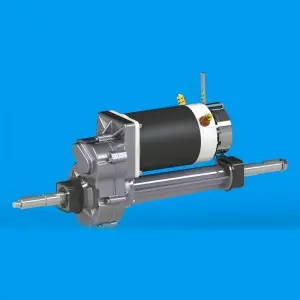There are various components that may be overlooked when understanding the complex operation of our vehicles. One of the key elements is transaxle fluid. Often overlooked, transaxle fluid plays a vital role in the overall performance and functionality of your vehicle. In this blog, we’ll explore what transaxle oil is, why it’s important, and how it can help keep your vehicle running smoothly.
Learn about transaxle fluid:
Transaxle fluid is a special type of lubricant designed for vehicles equipped with transaxle systems. A transaxle is a complex mechanical component that combines the functions of a transmission and a differential. It is responsible for transferring engine power to the wheels, enabling the vehicle to move forward or backward.
Importance of drive axle oil:
1. Lubrication and Cooling: Transaxle fluid acts as a lubricant, reducing friction and heat in transmission and differential components. This helps prevent excessive wear and prolongs the life of these critical components. In addition, the transaxle fluid acts as a coolant, dissipating the heat generated during vehicle operation.
2. Power Transmission: The transaxle fluid provides the hydraulic pressure for smooth power transfer from the engine to the wheels. This hydraulic pressure ensures that the gears are properly engaged and the vehicle accelerates, decelerates and shifts seamlessly.
3. Contaminant Removal: Transaxle fluid contains detergents that actively remove contaminants such as dirt, metal particles and sludge that may build up over time. If left unattended, these particles can damage the transaxle system, resulting in costly repairs.
maintenance:
Proper care and maintenance is essential to ensure optimum performance and life of your vehicle’s transaxle system. Here are a few key points to consider:
1. Periodic Fluid Checks: Periodically check your vehicle’s transaxle fluid level as recommended by the manufacturer. A low fluid level can cause insufficient lubrication and cooling, which can cause serious damage to the transaxle system.
2. Oil replacement: The drive axle oil should be replaced regularly in accordance with the vehicle maintenance plan. Over time, the fluid breaks down, loses viscosity and becomes contaminated, compromising its ability to protect the system.
3. Professional service: If you notice any unusual noise, vibration or difficulty when shifting gears, it is vital to seek professional service immediately. A trained mechanic can inspect and diagnose potential problems with your transaxle system and recommend appropriate repairs or fluid changes.
in conclusion:
Transaxle oil may appear insignificant compared to the other visible parts of your vehicle, but it plays a vital role in ensuring smooth power transmission, lubrication, cooling and removal of contaminants. By understanding the importance of transaxle fluid and maintaining it properly, you can protect the performance and life of your vehicle’s transaxle system. Regular inspections, fluid changes and professional repairs are essential to keeping your vehicle running smoothly. Don’t overlook the importance of this fluid if you want to enjoy a trouble-free driving experience.
Post time: Jun-16-2023


